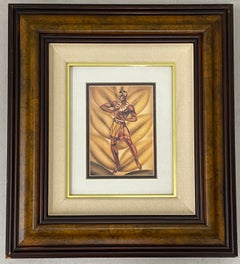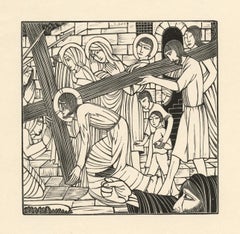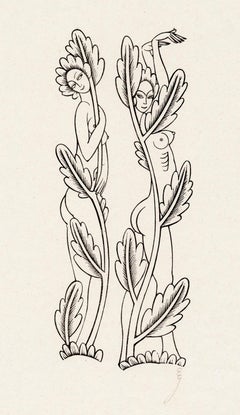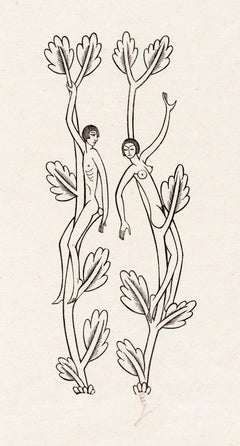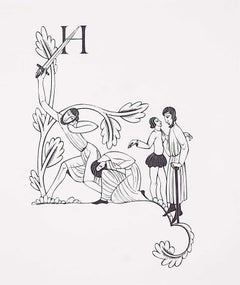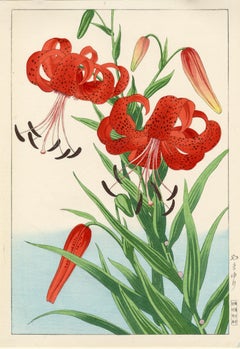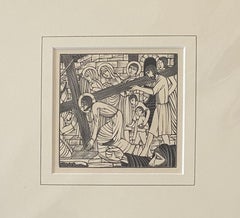Eric Gill Art
Arthur Eric Rowton Gill ARA was an English sculptor, typeface designer and printmaker. Following Chichester Technical and Art School, Gill moved to London in 1900 to train with the ecclesiastical architect W.D. Caröe. Finding architecture somewhat pedestrian, he took stonemasonry lessons at Westminster Technical Institute and calligraphy lessons at the Central School of Arts and Crafts, coming under the influence of Edward Johnson, the designer of the London Underground's typeface. In 1903, he ceased his attempts to become an architect, instead of becoming a monumental mason, letter-cutter and calligrapher.
Based in Ditchling, Gill began direct carving of stone figures, the semi-abstract figures taking their influence from medieval statuary, mixed with influences from Classical statuary from the Greeks and Romans, with a little Post-Impressionism added in. Gill was offered major commissions from Westminster Cathedral for its Stations of the Cross (1914); a series of war memorials including the Grade II* memorial in Trumpington; three of the sculptures for Charles Holden's 1928 headquarters of London Underground at 55 Broadway, St James's; and a series of sculptures for the new 1932 Broadcasting House — the list continues. Never one to rest on his laurels, he was at the same time engaged in typographical adventures.
Gill had collaborated with Edward Johnson on the latter's initial thoughts on his London Transport typeface, but in 1925, Gill designed Perpetua on his own, and Gill Sans between 1927–30. For the Golden Cockerel Press, he created, in 1929, a bolder typeface to complement wood engravings. And of course, Gill was publishing decorated books. His 1929 Canterbury Tales was an epic work, with a whole series of beautiful wood engravings.
Early 20th Century Tribal Eric Gill Art
Acrylic
1920s Eric Gill Art
Woodcut
1930s Art Deco Eric Gill Art
Woodcut
1930s Art Deco Eric Gill Art
Woodcut
1930s Modern Eric Gill Art
Woodcut
1930s Modern Eric Gill Art
Woodcut
1920s Art Deco Eric Gill Art
Lithograph
Mid-20th Century Modern Eric Gill Art
Lithograph
Mid-20th Century Modern Eric Gill Art
Lithograph
1930s Modern Eric Gill Art
Woodcut
1930s Modern Eric Gill Art
Woodcut
1920s Art Deco Eric Gill Art
Engraving
1930s Modern Eric Gill Art
Woodcut
1930s Modern Eric Gill Art
Woodcut
1920s Modern Eric Gill Art
Woodcut
1920s Modern Eric Gill Art
Woodcut
1960s Eric Gill Art
Woodcut
1930s Modern Eric Gill Art
Woodcut
2010s Contemporary Eric Gill Art
Canvas, Acrylic
2010s Tribal Eric Gill Art
Acrylic, Permanent Marker
21st Century and Contemporary Contemporary Eric Gill Art
Woodcut, Monoprint
1970s Abstract Eric Gill Art
Woodcut
2010s Abstract Impressionist Eric Gill Art
Canvas, Oil, Acrylic
1890s Modern Eric Gill Art
Woodcut
1840s Modern Eric Gill Art
Paper, Woodcut
1920s Art Deco Eric Gill Art
India Ink, Woodcut
1910s Abstract Expressionist Eric Gill Art
Woodcut
1920s Art Deco Eric Gill Art
Woodcut
1910s Art Deco Eric Gill Art
Engraving
1910s Art Deco Eric Gill Art
Engraving
20th Century Academic Eric Gill Art
Paper, Pencil
1920s Modern Eric Gill Art
Wood, Engraving, Woodcut
Early 20th Century Modern Eric Gill Art
Woodcut
1920s Modern Eric Gill Art
Wood, Engraving, Woodcut
1930s Modern Eric Gill Art
Woodcut
1920s Modern Eric Gill Art
Wood, Engraving, Woodcut
Early 20th Century Eric Gill Art
Engraving
Early 20th Century Modern Eric Gill Art
Engraving
Early 20th Century Modern Eric Gill Art
Woodcut
Early 20th Century Modern Eric Gill Art
Engraving, Woodcut
Eric Gill art for sale on 1stDibs.
Artists Similar to Eric Gill
- What was Eric Gill famous for?1 Answer1stDibs ExpertJanuary 10, 2025Eric Gill was famous for his work as an artist. He was an English sculptor, typeface designer and printmaker. After attempting to become an architect, Gill began direct carving of stone figures, the semi-abstract works taking their influence from medieval statuary, mixed with influences from classical statuary from the Greeks and Romans, with a little Post-Impressionism added in. Gill was offered major commissions from Westminster Cathedral for its Stations of the Cross (1914); a series of war memorials; three of the sculptures for Charles Holden's 1928 headquarters of London Underground; and a series of sculptures for the 1932 Broadcasting House. He was at the same time engaged in typographical work. Gill had collaborated with Edward Johnson on the latter's initial thoughts on his London Transport typeface, but in 1925, Gill designed Perpetua on his own and Gill Sans between 1927 and 1930. For the Golden Cockerel Press, he created, in 1929, a bolder typeface to complement wood engravings. Gill also published decorated books. His 1929 Canterbury Tales is an epic work with a whole series of beautiful wood engravings. Explore a collection of Eric Gill art on 1stDibs.
